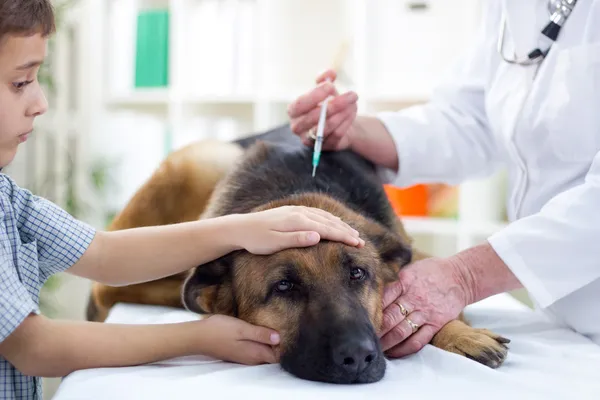Share this @internewscast.com
Linking Pet Vaccinations and Human Vaccine Hesitancy – A recent study conducted by Dr. Simon Haeder of Texas A&M University School of Public Health delves into the intriguing realm of pet vaccination attitudes and their potential connection to human vaccine hesitancy. Published in the esteemed journal Vaccine, this research sheds light on how our furry companions serve as unexpected mirrors, reflecting our underlying beliefs about immunization.
The study surveyed over 3,400 pet owners, delving into their vaccination practices for five core and non-core canine and feline diseases, including rabies, parvovirus, and panleukopenia. Beyond simply recording vaccination rates, Dr. Haeder meticulously explored the rationale behind owners’ choices. By gauging their perceptions of vaccine safety, efficacy, and importance, the study illuminates the intricate tapestry of factors influencing vaccination decisions.
Linking Pet Vaccinations and Human Vaccine Hesitancy

The findings paint a fascinating picture. While rabies vaccination boasts near-universal compliance across both dog and cat owners, other essential vaccines encounter varying degrees of hesitancy. Notably, non-core vaccines, often deemed less critical based on individual lifestyle factors, face higher resistance. This suggests a nuanced understanding of risk and perceived necessity driving vaccination choices.
But the implications transcend the realm of pet well-being. The study reveals a striking correlation between perceptions of pet vaccines and attitudes towards human vaccinations. Interestingly, those who hold positive views about one tend to harbor similar sentiments towards the other. This phenomenon extends to support for vaccination requirements, highlighting the potential for spillover effects between human and animal vaccine hesitancy.
Read Related Also: 20 Best High-Protein, Low-Calorie Foods — Eat This Not That
The study also uncovers intriguing demographic patterns. Owners who incur fewer non-veterinary expenses, such as boarding or training, tend to exhibit higher vaccine hesitancy. This suggests a possible link between access to veterinary care and vaccine acceptance. Additionally, while political ideology plays a significant role in human vaccine hesitancy, it appears to have less influence on pet vaccination decisions, offering another interesting dimension to consider.
Dr. Haeder’s research underscores the critical need to address vaccine hesitancy across the spectrum, encompassing both human and animal health. His findings point towards the value of targeted educational campaigns that address underlying concerns and misconceptions about vaccines, tailored to resonate with diverse demographic groups. By fostering trust and understanding, we can ensure that our furry companions, and ourselves, reap the full benefits of safe and effective immunization programs.
Ultimately, this study serves as a powerful reminder that the bond between humans and animals extends beyond companionship. Our decisions regarding their health can illuminate and inform our own approach to disease prevention. By listening to the silent whispers of pet vaccination choices, we can gain invaluable insights into the complex landscape of vaccine hesitancy and pave the way for a healthier future for all. Study source [https://today.tamu.edu/2023/12/22/connections-between-vaccine-hesitancy-and-support-for-vaccinating-pets/]
Key Facts
- High Rabies Vaccination Rates: Overwhelming majority of pet owners vaccinate their dogs and cats against rabies, with cats slightly lagging behind dogs.
- Hesitancy for Non-Core Vaccines: Core vaccines see high uptake, but non-core vaccines targeting less common diseases face greater hesitancy.
- Perceptions Matter: Positive views on pet vaccine safety, efficacy, and importance predict similar positive attitudes towards human vaccines.
- Spillover Effect: Support for pet vaccination requirements is strongly associated with support for human vaccination mandates.
- Underlying Factors: Hesitancy may be linked to factors like non-veterinary expenses and lack of trust in science.
- Political Disconnect: Unlike human vaccines, pet vaccination decisions appear less influenced by political ideology.
- Call to Action: Concerns about vaccine hesitancy in both pets and humans warrant serious attention to prevent outbreaks.
DON’T MISS: Does Citrus Supplement Ease Knee Swelling and Pain After Surgery? What Study says









